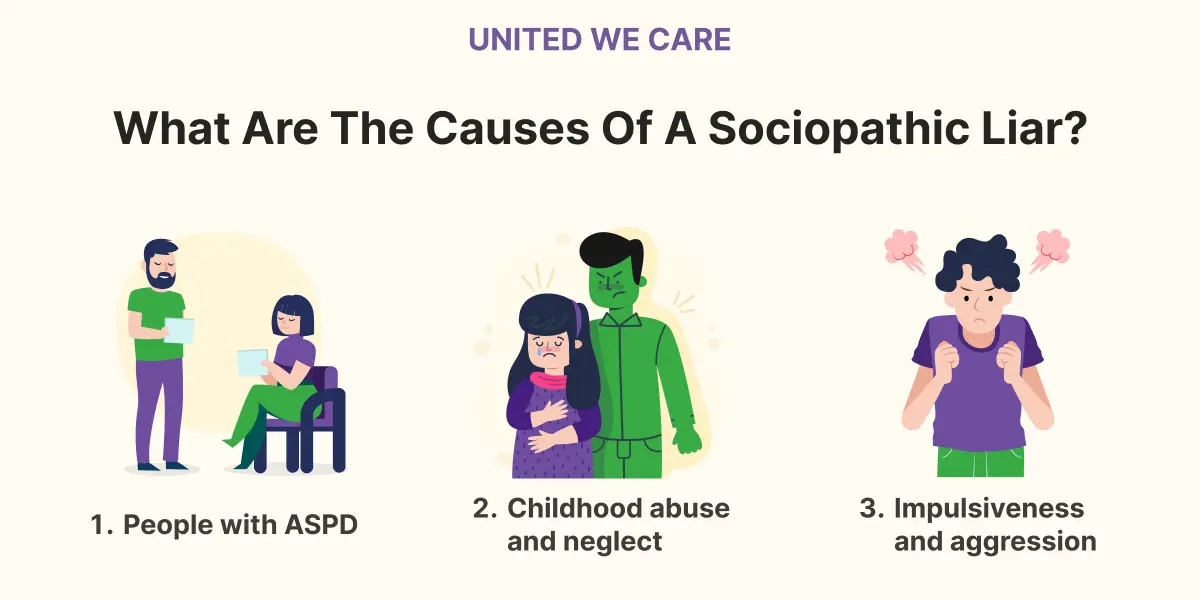Introduction
Lying is a common practice. By the time we’re two years old, we learn how to lie, and by age four, we can lie convincingly.
In fact, lying and pretending about someone we’re not has become a natural behavior for us owing to the works of social media. When our white lies accompany guilt and a promise not to repeat, it makes these lies into ordinary mistakes that can be forgotten and forgiven. So, how do we draw the boundary between small, unharmful lies and lies that can derail the well-being of us and others?
People who are sociopathic or have Antisocial Personality Disorder (ASPD) have a total disregard for others’ feelings and rights. Hence, their lies are manipulative and potentially dangerous to their victims. [1]
Lying disrupts trust. It can result in a lot of confusion and emotional chaos. Understanding the roots of this complex lying behavior is the first step to learning to deal with a sociopathic liar.
In addition, a sociopathic liar lies for no reason at all. They lie at times just to see the results or outcomes of their lie, to check their viability as a liar, and to test their skills in a social setting. They have little to no empathy for other people in general, and their lies can be cunning, cruel, and calculative. You may even find them firmly believing their lies even when there is no ounce of fact to it.
Sociopathic liars use their lies as weapons to gain favor in the form of trust, sympathy, or pity from you. They cleverly glorify their version of truth into a compelling story for you, which gives them a soft spot in your perception, helping them gain what they want.
What Are The Symptoms Of A Sociopathic Liar?
When you come across a sociopathic liar, you can look out for signs and symptoms such as:
- They do not lie out of a need to protect themselves or in a specific situation. They lie regardless of the circumstances, and they lie constantly. They concoct stories and twist facts just because they want to and can.[2]
- They can get anything done. ANYTHING. You will find them manipulating people to do things for them and support them unquestioningly, while the other person does not even realize they’re being taken advantage of.
- Not only do they not care about the impact their lies will have on others, but also when caught, they will show no remorse for lying or hurting others. They do not understand empathy and guilt.
- The way they carry themselves and the way they talk possess a certain kind of charm that is hard to resist. This is how they’re easily able to win over and deceive others. They’re very good at hiding their true intentions.
- They simply do not care about the consequences of their behavior. This is why they make impulsive and reckless decisions. And if you confront them, they’ll probably use anger and violence as tools to assert their dominance over you.
- Because of their behavior, they might not have any close or long-term relationships either.
What Are The Causes Of A Sociopathic Liar?
According to clinical psychologist and author Martha Stout, a predisposition for the characteristic of a sociopathic liar is present at conception. However, its expression is regulated based on the environment.
The causes of sociopathic lying are a combination of genetic, environmental, and psychological factors.

- People with ASPD: People with ASPD have been observed to have abnormalities in brain structure and function, particularly in areas related to impulse control and regulation of emotions. This could be why they lie incessantly and without any remorse. If they have a parent or a close relative with ASPD, their chances of developing the same increase significantly.
- Childhood abuse and neglect: Childhood abuse and neglect can have a damaging effect on the person who experiences them. The development of sociopathic traits can also be a result of a dysfunctional family environment. Being manipulative could have been a survival mechanism for them. Not having a reliable parent to discipline them or anyone to look up to can be why they lack respect for people in general.
- Impulsiveness and aggression: Their impulsiveness and aggression can just be how they are as a person. These personality traits are shaped by both their genetic and environmental factors, which can result in sociopathic behavior.
How To Deal With a Sociopathic Liar?
Do not take their behavior personally. It’s important to remember that their behavior is rarely about you and almost always about them. Their lying behavior started long before your exchanges with them and has many complex roots.
If you’re dealing with a sociopathic liar, your focus should be on protecting yourself. You must avoid sharing your vulnerabilities or personal details that they could use against you.
Get clarity within yourself as to what kind of behavior you can and cannot entertain. Draw boundaries to protect your peace and sanity and communicate these to them firmly.
Even if you’re tempted to call them out on their lie, avoid confronting them in a volatile manner. If you do that, they might become defensive or try to deceive you further.
If necessary, start documenting your exchanges with them. This record can help if their behavior gets too threatening and legal action needs to be taken against them.
It is emotionally draining to deal with a sociopathic liar. Ultimately, you have to protect your own mental well-being, so be prepared to distance yourself from the relationship if it gets too overwhelming.
Conclusion
While sociopaths are different from psychopaths, experiences with them can be equally harmful and traumatic. A sociopathic liar lies without remorse.
The impact of a sociopathic liar is deep and violent. Some of these impacts include mistrust, insecurity, anxiety, and even PTSD. The causes of their lying can be a combination of genetic, environmental, and temperament factors.
If the lying is causing immense mental distress to you, you must seek the support of a mental health professional. At United We Care, we offer the most appropriate, clinically backed solutions for all your needs for well-being.
References:
[1] American Psychological Association, “Antisocial Personality Disorder,” in APA Dictionary of Psychology. [Online]. Available: https://dictionary.apa.org/antisocial-personality-disorder
[2] Paula M. MacKenzie, “Psychopathy, Antisocial Personality & Sociopathy: The Basics,” Year. [Online]. Available: https://citeseerx.ist.psu.edu/document?repid=rep1&type=pdf&doi=9a5f49475cfb0fca1f4dffa1026c0ae71b20c5d3
[3] Dr. Gini Graham Scott, Lies, and Liars: How and Why Sociopaths Lie and How You Can Detect and Deal with Them, Simon and Schuster, 2016. [Online]. Available: https://books.google.co.in/books?id=Vy-CDwAAQBAJ









